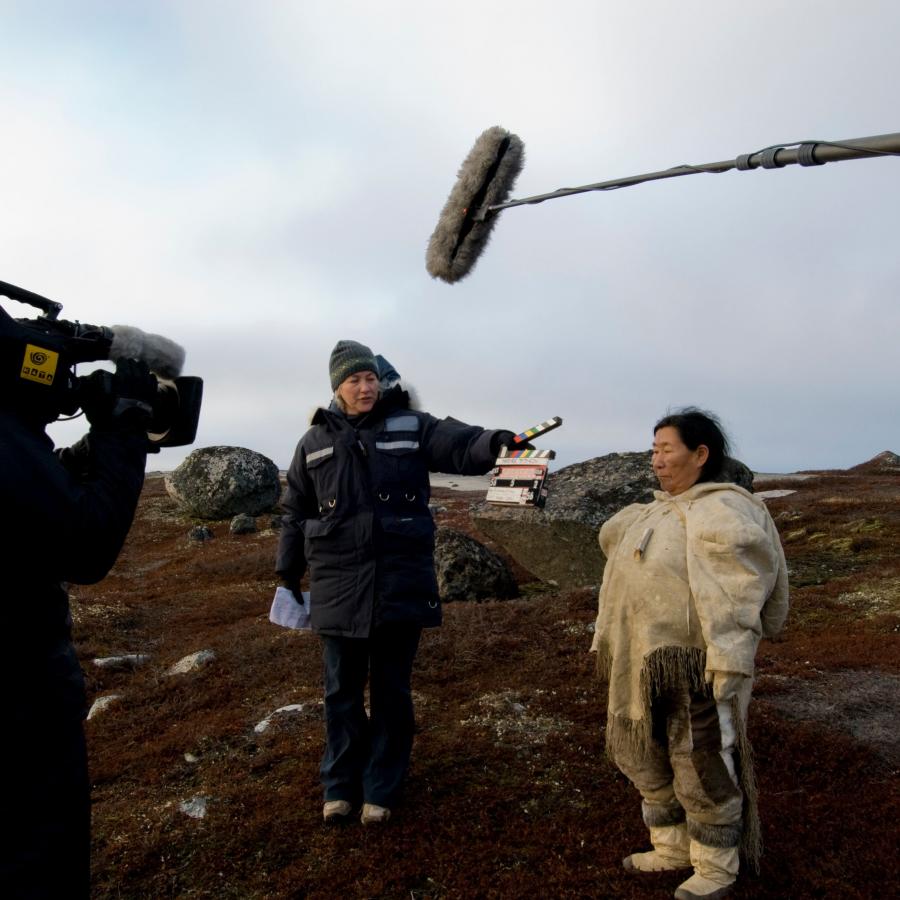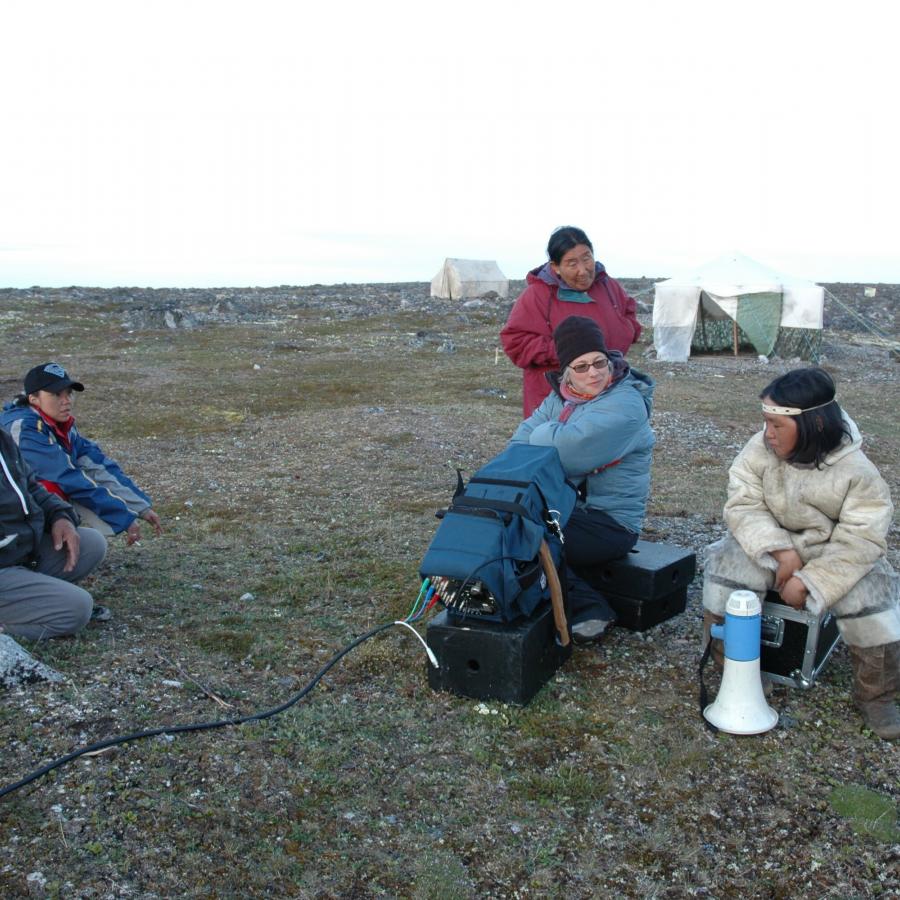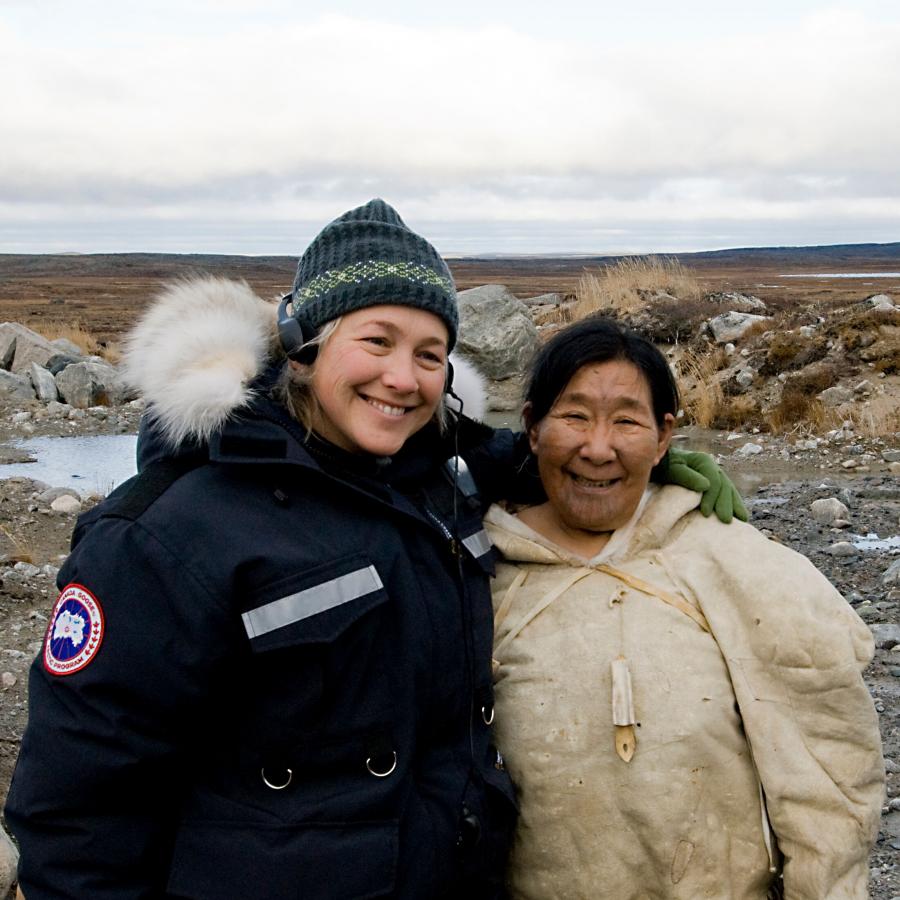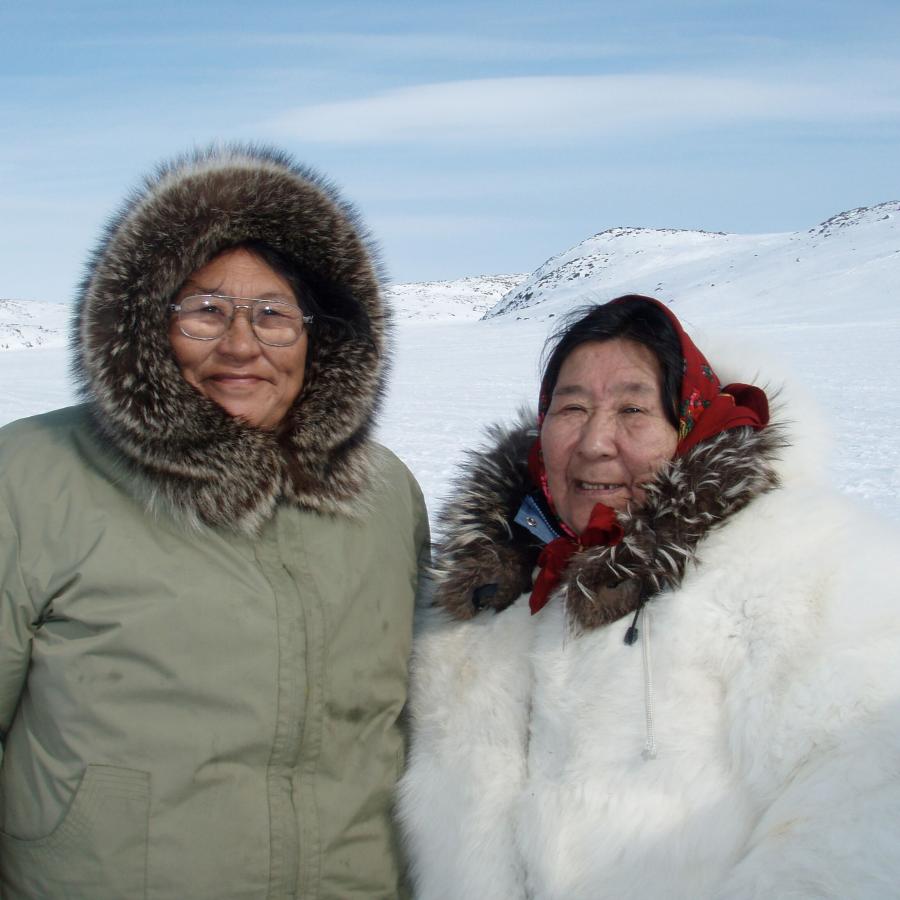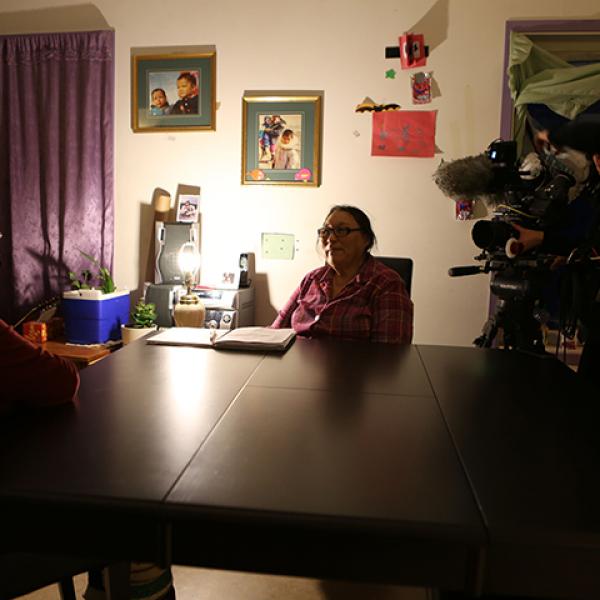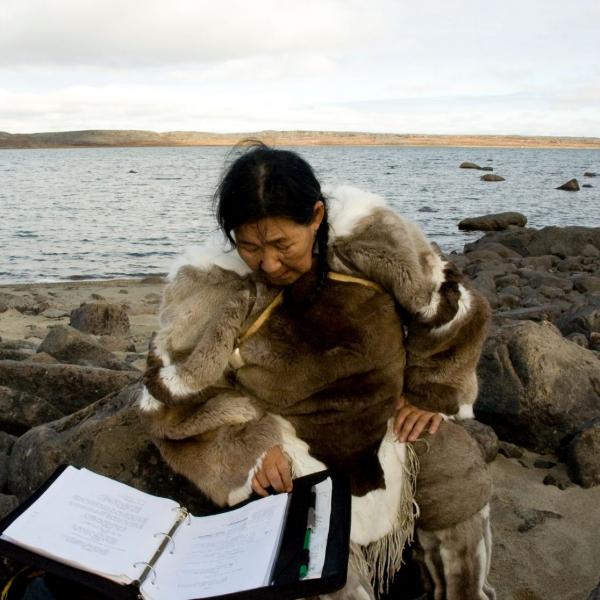This Case Study focuses on a collection of films and production materials created by Arnait Video Productions members. The Vulnerable Media Lab and the team of researchers from Queen’s University have been collaborating closely with the Arnait video collective of Inuit women to remediate, digitize and keep the Arnait archive alive and well. Queen’s University Archives currently holds a collection of 332 audio-visual assets and two boxes of ephemera from Arnait Video Productions. The collection encompasses thirty years of stories, interviews, production materials and documentation related to the work of the Inuit women’s collective.
We have been working to make the digitized films and media content available to the collective and, in consultation with Arnait members, to make some content accessible the general public. This Case study focuses on the collection as a living archive, which is activated through ongoing engagement with different audiences and in different contexts.
Case Study Updates:
The Case Study has been been involved in a series of activities relating to Arnait and their archive, including:
Digitization: June 2019-ongoing
The content of the eight boxes that comprise the Arnait collection (six of audio-visual materials and two of ephemera) has now been catalogued and technical metadata has been generated. The Vulnerable Media Lab is working toward the eventual digitization of all audio-visual materials from the collection to ensure preservation and access to the content. Currently, thirty-four videos have been digitized and we are collaborating with collective members to determine order of priority for further digitization. We are also in the process of getting the metadata translated to Inuktitut so that other Arnait members to be able to review the contents of the collection. When the collection is fully digitized, hard drives with digital copies can be sent to all members of Arnait. Arnait collective members are also using digitized copies of materials to screen on Uvagut, Canada’s first Inuktut television channel.
Exhibition: January-August 2020
The exhibition Inuuqatikka: my dear relations ran from January 11-August 9, 2020 at the Agnes Etherington Art Centre on the Queen’s University campus. Through the films and video work of the Arnait Video Productions, Inuuqatikka brings focus to the kin-centered outlook of Inuit women in the Arctic. Inspired by the spaces in which women gather, the “white cube” gallery space has been re-envisioned as the interior of a white canvas tupik (tent), with uyarait (rocks) lining the perimeter to keep the wind and cold out and the qulliq (oil lamp) lit to keep families warm. Within the space of the tupik, the films are contextualized by content drawn from the Arnait Video Productions archival collection. Exhibition text and labels were produced in Inuktitut syllabics, Inuktitut, French and English and this commitment to translation is something that we intend to continue throughout the project. This exhibition was curated by Nakasuk Alariaq (Inuk-Cape Dorset/London, ON), Linda Grussani (Algonquin Anishinabekwe-Ottawa, ON) and Tamara de Szegheo Lang (Kingston, ON).
Artist Residency: March 2020
In March 2020, right before the COVID lockdown, members of the Arnait collective travelled to Queen’s University (two from Montreal, two from Igloolik) for a one-week artist residency. The members who participated were Lucy Tulugarjuq (writer, director, actor, producer), Madeline Ivalu (executive producer, writer, actor, director, musician, consultant), Susan Avingaq (executive producer, director, musician, writer), and Marie-Hélène Cousineau (producer, director, writer, curator). They took part in a series of workshops on adoption, intergenerational communication and collective memory with Queen’s professors and students, as well as meetings and discussion about their archival collection.
On March 13, the collective was set to participate in a roundtable discussion about Inuuqatikka at the Agnes Etherington Centre titled Unpacking Conversation: Intergenerational Archival Engagement. When this was cancelled due to COVID, the collective members filmed an interview about their archival collection and a tour of the exhibition with two of the exhibition’s co-curators, which was livestreamed on Isuma.tv to reach viewers across Inuit Nunangat.
Translation
We are currently applying for a number of grants that will give us the funding needed to translate the collection’s metadata, as well as some audio-visual materials. This is very important in ensuring the accessibility of these materials to the members of the collective who speak their maternal language of Inuktitut.
Publications
Articles are currently being developed for Archive/Counter-Archive and external publications.
Online Exhibition
Alariak, Grussani, and de Szegheo Lang are currently working on an online version of Inuuqatikka in order to broaden the audiences who can access Arnait’s work and archival content.
About Arnait Video Productions
The goal of Arnait Video Productions (originally the Women’s Video Workshop of Igloolik) is to value the unique culture and voices of Inuit women and to open discussions with Canadians of all origins. Since its beginnings in 1991, Arnait Video Productions has traced a trajectory revealing the originality of its producers, the context of their work and lives, as well as their strong desire to express cultural values unique in Canada.
Land Acknowledgement
Queen’s University is situated on traditional Anishinaabe and Haudenosaunee territory. We are grateful to be able to be live, learn and play on these lands.
To acknowledge this traditional territory is to recognize its longer history, one predating the establishment of the earliest European colonies. It is also to acknowledge this territory’s significance for the Indigenous peoples who lived, and continue to live, upon it and whose practices and spiritualties were tied to the land and continue to develop in relationship to the territory and its other inhabitants today. The Kingston Indigenous community continues to reflect the area’s Anishinaabek and Haudenosaunee roots. There is also a significant Métis community and there are First people from other Nations across Turtle Island present here today.
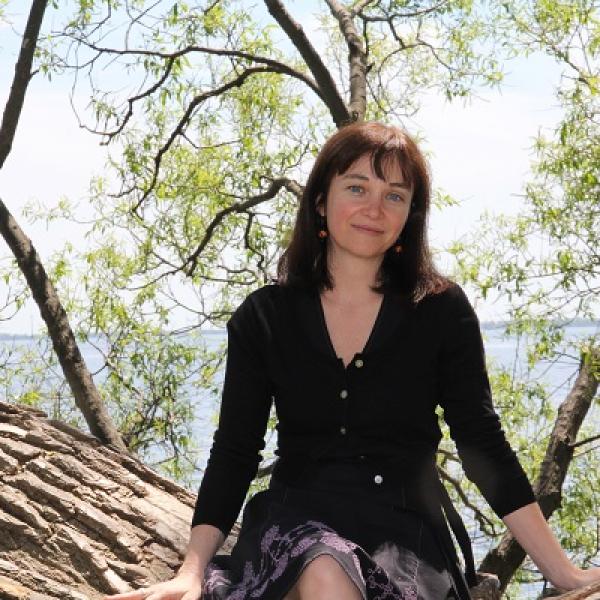
Karine Bertrand
My interest for cinema and films in general came from watching old black and white movies with my grandma on PBS on Sunday afternoons. Beyond these old Hollywood narratives, I have grown to love films stemming from all parts of the world. More recently, my research interests have been centered on Quebec cinema (intercultural collaborations), Indigenous films and poetry, road movies, transnational cinemas and oral practices of cinema.
I am also a member of the Vulnerable Media Lab at Queen’s and lead researcher for the Archive/Counter-Archive research project (financed by SSHRC) working with the Arnait Video Productions collective of Inuit women and with Québécois filmmaker Marie-Hélène Cousineau. I am co-director of the research group EPIC (esthétique et politique de l’image cinématographique) where we discuss the politics and aesthetics of screen images. My latest publications include a book chapter on the rock group U2 ( MacKenzie and Iversen, 2021) a book chapter on the exploration of Indigenous lands (Cahill and Caminati, 2020) an article on Indigenous women and testimonies (Canadian Journal of Film Studies, 2020) on Québécois cinema and Americanité (American Review of Canadian Studies, 2019) and a book chapter on Canadian and Québécois Indigenous cinemas (Oxford Handbook to Canadian Cinema, 2019). I am presently working on a project involving the creation of an international network for Indigenous women filmmakers, and continuing partnerships with the Wapikoni Mobile and the INAAC (the International Network for Aboriginal Audio-Visual Creation).
Besides my research, which I am very passionate about, I love to be outdoors, connecting with nature. I have studied medicinal plants and take every occasion I get to play outside; canoeing, hiking, skiing, camping, gardening. I also love writing poetry and teaching courses where I can develop a strong connection with my students.

Claire Gray
Claire Gray is a research assistant to Professor Karine Bertrand in the Arnait Video Productions case study. She has just finished her MA in Film Studies at Concordia University.

Linda Grussani
Linda Grussani (Kitigan Zibi Anishinabeg) is a curator and art historian born and raised in the Ottawa area. Currently, she is working full-time towards completing a PhD in Cultural Studies at Queen’s University. Over the last decade, Linda had held the position of Curator, Aboriginal Art at the Canadian Museum of History (CMH); Director, Indigenous Art Centre for Crown Indigenous Relations and Northern Affairs Canada (CIRNAC); and has worked in the Indigenous art department at the National Gallery of Canada. Linda holds both a BA and MA in Art History from Carleton University and is a graduate of CIRNAC’s Aboriginal Leadership Development Initiative (2014-15) and the CMH’s Indigenous Training Programme in Museum Practices (2000-2001). Linda currently sits on the Indigenous Education Council for OCAD University, the Indigenous Collections Symposium Working Group for the Ontario Museums Association, and is a collaborator with the North American Cultural Diplomacy Initiative.
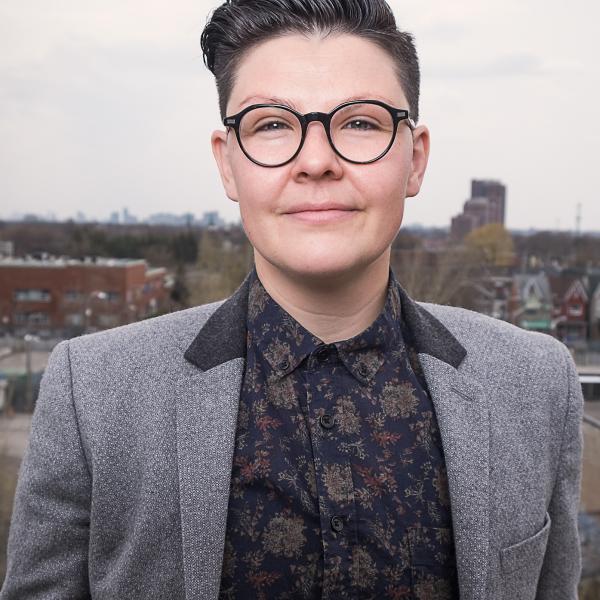
Tamara de Szegheo Lang
Tamara de Szegheo Lang is Project Manager of the Vulnerable Media Lab and Adjunct Assistant Professor in the Department of Film and Media at Queen’s University. She holds a doctorate in Gender, Feminist, and Women’s Studies from York University. Dr. de Szegheo Lang’s research takes up queer history, community-based archives, visual culture, and the affective relationships between LGBT2Q people and the past. Her publications have appeared in the Journal of the Canadian Historical Association, the Journal of Lesbian Studies, and the Journal of Homosexuality. Dr. de Szegheo Lang is also active in curatorial and programming roles. She is a member of the programming committee for the Reelout Queer Film Festival in Kingston, a co-programmer of the Born in Frames Screening Series at Queen’s University, and past curatorial committee co-chair of the Canadian Lesbian and Gay Archives.


